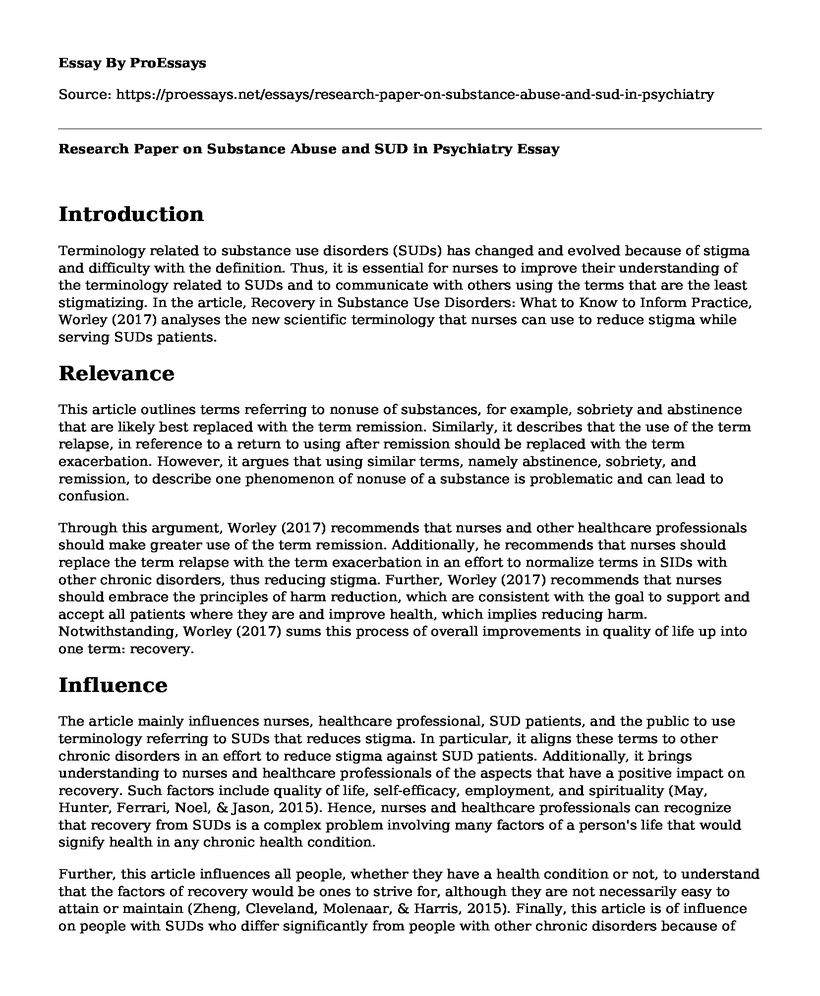Introduction
Terminology related to substance use disorders (SUDs) has changed and evolved because of stigma and difficulty with the definition. Thus, it is essential for nurses to improve their understanding of the terminology related to SUDs and to communicate with others using the terms that are the least stigmatizing. In the article, Recovery in Substance Use Disorders: What to Know to Inform Practice, Worley (2017) analyses the new scientific terminology that nurses can use to reduce stigma while serving SUDs patients.
Relevance
This article outlines terms referring to nonuse of substances, for example, sobriety and abstinence that are likely best replaced with the term remission. Similarly, it describes that the use of the term relapse, in reference to a return to using after remission should be replaced with the term exacerbation. However, it argues that using similar terms, namely abstinence, sobriety, and remission, to describe one phenomenon of nonuse of a substance is problematic and can lead to confusion.
Through this argument, Worley (2017) recommends that nurses and other healthcare professionals should make greater use of the term remission. Additionally, he recommends that nurses should replace the term relapse with the term exacerbation in an effort to normalize terms in SIDs with other chronic disorders, thus reducing stigma. Further, Worley (2017) recommends that nurses should embrace the principles of harm reduction, which are consistent with the goal to support and accept all patients where they are and improve health, which implies reducing harm. Notwithstanding, Worley (2017) sums this process of overall improvements in quality of life up into one term: recovery.
Influence
The article mainly influences nurses, healthcare professional, SUD patients, and the public to use terminology referring to SUDs that reduces stigma. In particular, it aligns these terms to other chronic disorders in an effort to reduce stigma against SUD patients. Additionally, it brings understanding to nurses and healthcare professionals of the aspects that have a positive impact on recovery. Such factors include quality of life, self-efficacy, employment, and spirituality (May, Hunter, Ferrari, Noel, & Jason, 2015). Hence, nurses and healthcare professionals can recognize that recovery from SUDs is a complex problem involving many factors of a person's life that would signify health in any chronic health condition.
Further, this article influences all people, whether they have a health condition or not, to understand that the factors of recovery would be ones to strive for, although they are not necessarily easy to attain or maintain (Zheng, Cleveland, Molenaar, & Harris, 2015). Finally, this article is of influence on people with SUDs who differ significantly from people with other chronic disorders because of stigma and common misunderstandings of the disorder. Moreover, it gives a supportive approach to patients suffering from SUDs using the new terminology.
Summary
In summary, Worley (2017) gives a clear description of the evolution of terminology related to SUDs, which seeks to end the stigma and difficulty of the definition of SUDs terms. Understanding and the use of the new most accurate and scientific terminology will be vital for nurses and healthcare professionals in reducing stigma related to SUDs. Additionally, it will ensure nurses are aware of and take steps to measure patients' quality of life, self-efficacy, and spirituality with validated tools to identify weakness and implement interventions for improvement. Notably, this is in an effort to maintain a hopeful and positive patient-centered approach when working with SUD patients and guiding them on their recovery journeys.
References
May, E. M., Hunter, B. A., Ferrari, J., Noel, N., & Jason, L. A. (2015). Hope and abstinence self-efficacy: Positive predictors of negative affect in substance abuse recovery. Community mental health journal, 51(6), 695-700.
Worley, J. (2017). Recovery in substance use disorders: what to know to inform practice. Issues in mental health nursing, 38(1), 80-91. DOI: 10.1080/01612840.2016.1245375
Zheng, Y., Cleveland, H. H., Molenaar, P. C., & Harris, K. S. (2015). An alternative framework to investigating and understanding intraindividual processes in substance abuse recovery: An idiographic approach and demonstration. Evaluation review, 39(2), 229-254.
Cite this page
Research Paper on Substance Abuse and SUD in Psychiatry. (2022, Oct 24). Retrieved from https://proessays.net/essays/research-paper-on-substance-abuse-and-sud-in-psychiatry
If you are the original author of this essay and no longer wish to have it published on the ProEssays website, please click below to request its removal:
- Should the U.S. Government Decriminalize Drugs? - Argumentative Essay
- Research Paper on Psychological and Social Theories on Violence
- Research Paper on Self-Esteem and Life Satisfaction
- Identification and Evaluation of Normative Leadership Theory Paper Example
- Essay Sample on Aging: From Birth to Death - What Causes It?
- Research Paper on ADHD: Definition, Causes, Symptoms, & Treatment
- Experiencing Autism: The Challenges, Isolation, and Need for Change in Utah - Free Essay







